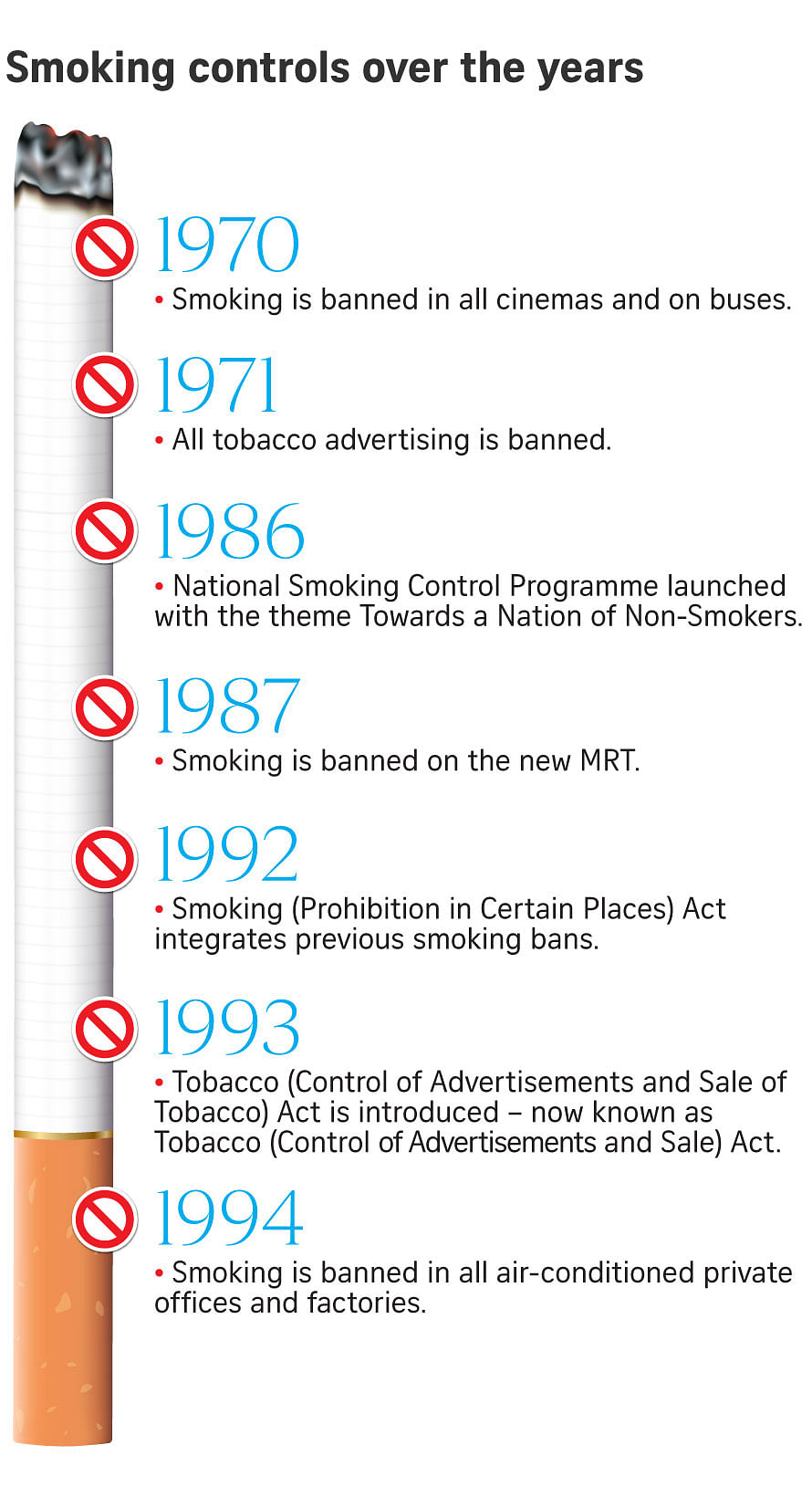SINGAPORE - What started as a curiosity for a 16-year-old, wanting to be cool and fit in with friends, quickly turned into a full-blown habit. Today, Chris is a self-confessed smoking addict.
That is not his real name, and with reason: As of Friday (Jan 1), the full-time national serviceman, 20, became guilty of underage smoking.
On Jan 1 this year, the minimum legal age for buying and using tobacco products was raised from 20 to 21, after being increased from 18 to 19 in 2019 and then to 20 in 2020.
But Chris says his father, a fellow smoker, can easily help him buy a pack of cigarettes anyway. He said: "I can just get older friends to buy for me too. When I really need it, I will find ways to get it."
His perspective, and those of other teenage smokers The Sunday Times spoke to, belies the precise intent behind raising the minimum age: to limit young people's access to tobacco products and to "denormalise" smoking, according to the Health Ministry.
The public health reasons are well-documented.
In an opinion piece for The Straits Times published on New Year's Day, Professor Teo Yik Ying and Dr Yvette van der Eijk of the National University of Singapore's (NUS) Saw Swee Hock School of Public Health called for the age limit to be raised further to 25.
They noted that one in two smokers will die from the habit and pointed out that the damage goes beyond being self-inflicted. In Singapore, over 300 non-smokers die each year because of exposure to second-hand smoke.
The two experts offered four other proposals to plug what they identify as remaining policy gaps in Singapore's tobacco control regime: raising taxes on tobacco further, banning flavours, improving quitting programmes and more curbs on second-hand smoke.
Should the minimum age be raised further?
Probably more than half of Singaporeans were smokers in the 1950s, says Professor Chia Kee Seng, the founding dean of NUS' public health school.
With research over the following decades increasingly linking smoking to various afflictions, prohibitions were introduced in the 1970s, and in 1993 an age limit of 18 was set.
In 2017, legislation was passed to progressively raise the minimum legal age (MLA) to 21 by this year.
Prof Teo and Dr van der Eijk want to see this roll on to an age limit of 25 in the year 2025 - and perhaps even beyond, until smoking is effectively obsolete.
"The intention is actually to continue pushing for the MLA to increase indefinitely," says Prof Teo, adding that this would be a more realistic way for Singapore to eventually be tobacco-free than to enforce a sudden, immediate ban.
Prof Chia said: "There is evidence that the parts of the brain most responsible for decision making, impulse control, and peer susceptibility and conformity become fully developed at about age 25."
But not all smoking cessation advocates agree.
Dr Ong Kian Chung, a respiratory physician at Mount Elizabeth Hospital, thinks the minimum age should stay at 21.
"Eighty per cent of smokers are known to be hooked by the time they are 21," he says. "It makes sense... in line with other well-accepted tenets of independence and legal age of consent.
"For the young men in Singapore, it will also make it less likely they will pick up smoking while doing national service."
Sociologist Paulin Straughan of the Singapore Management University agrees. She said: "It would be hard to justify any limitation above 21 years, as we generally recognise that it is the mark that defines adulthood."
Chris's experience also underscores how easy it is to get around the minimum age rule.
Smoke-free advocate Jon Berrick, a mathematics professor at Yale-NUS College, considers such laws to be fundamentally flawed.
"(They) send the misleading message that there is a 'safe' age for smoking, and thus downplay the health consequences. Hence, they send youth the signal that the aim of the measures is youth control rather than tobacco control. And how would you expect an adolescent to react to that signal?" he says.
"Minimum-age laws (also) make the cigarette 'a badge of coming of age', a way of seeming grown-up, an effective hook for troubled adolescents."
A smoker who wanted to be known only as CK says this could well be the case.
"When I picked it up in secondary school, there was this perception that 'it's cool because I'm doing something adult'," says the 32-year-old, who works in advertising. "I think if you removed the age limit, fewer underage people would pick up the habit."
Prof Berrick says a more effective alternative would be to ban the sale of tobacco to anyone born from 2000. This would help prevent tobacco use among those not yet addicted and could, over time, eliminate it altogether.
He came up with this "tobacco-free generation" or "endgame" proposal back in 2005, and in 2010 teamed up with Singaporean medical professionals to co-author a research paper on the topic.
It has been brought up in Parliament on at least three occasions since, but the Health Ministry said each time that there would be significant practical challenges in implementing such a measure.
Former MP Lee Bee Wah, however, believes such a generational approach could work. "Many of my residents used to say they expect to smoke for the rest of their lives, since it's not easy to quit," she recalls. "But many also said they don't want their children to smoke."
What more can be done?
The age restriction is one of several measures in the Government's arsenal against smoking. Others include public education, taxation, cessation programmes, point-of-sale display bans and standardised packaging.
Prof Teo and Dr van der Eijk have made the case for further raising tobacco taxes. Excise duties were last hiked by 10 per cent in 2018, after a similar increase in 2014. Both times, it led to prices of cigarette packs going up by at least $1.
Asked if further increases could spark surging contraband activity, Prof Teo said penalties for smuggling can be stepped up if necessary.
But Dr van der Eijk said this notion of levy increases leading to a bigger black market is a common myth spread by tobacco companies - with their "substantial amounts of financial and political power" - to deter governments from increasing tobacco taxes.
"Tobacco companies often generate their own data on illicit trade which usually overestimates and exaggerates the figures," she said.

In their opinion piece, she and Prof Teo wrote: "The World Health Organisation calls tobacco taxes a 'best buy' against chronic diseases - a policy measure that is cost-effective to enact at the population level."
But more should be done to target not just users of tobacco, said Prof Berrick, who added: "The emphasis of the law should be on the purveyors of these products, just as for other harmful addictive substances we especially target the dealers and pushers."
In response to The Sunday Times' queries, the Tobacco Association of Singapore, which represents the industry, issued a statement: "With regard to the efficacy of various new tobacco control regulations that have been introduced over the last few years, the (association) would like to stress that any new policies should be balanced, proportionate and backed by science and evidence."
Smokers said increasing prices over the years have had little to no impact on their habit - and that they would not be deterred by future spikes.
MP Louis Ng, a former smoker of 17 years, said: "As a smoker I would just pay more, and do something else less, to continue the habit."
Prof Teo and Dr van der Eijk proposed following Canada, Turkey, Brazil, parts of the United States as well as European countries in banning outright flavours such as menthol, mint and fruits, which make cigarettes more appealing.
For Dr Julian Hong, a physician at the DTAP Clinic group, enhancing cessation efforts is another crucial piece of the puzzle.
The Government is piloting subsidised nicotine replacement therapies (NRT) for eligible participants, at public healthcare institutions.
Dr Hong and Dr van der Eijk said this should be made available to everyone.
Dr van der Eijk said: "The next step would be to include more options beyond NRT (such as medications), incorporate counselling services, and see how the programme can be tailored to the individual's needs."
Prof Teo said employers could provide incentives for workers to quit smoking. "The workplace is a powerful environment when it comes to social and behavioural influences in health promotion."
Should smoking in public be banned altogether?
Shared public spaces have also been the focus of the national smoke-free push.
The list of smoking-prohibited places is gradually expanding, and Prof Teo and Dr van der Eijk said the list could be made even longer.
Dr van der Eijk added that the lack of regulation in crowded entertainment areas like Clarke Quay and Haji Lane might encourage social smoking among young people who frequent these places.
And second-hand smoke in high-rise residences is a growing issue, with Dr van der Eijk noting the sharp increase in complaints last year.
Mr Ng, the MP, has called for a ban on smoking near windows or balconies at homes. But instead of that, Dr van der Eijk suggests making housing blocks completely smoke-free, with open-air designated smoking areas set up nearby.

Fifty of these can be found in the Nee Soon area, thanks to an initiative started by the former MP Ms Lee, who told The Sunday Times that people should also be banned from smoking while walking.
Senior Minister of State for National Development Sim Ann, who is considering designated smoking points in her Bukit Timah ward, said people are increasingly vocal in their disapproval of second-hand smoke. "I can see more pressure being brought to bear on smokers," she added.
That smokers should preserve the freedom to light up, however, was not contested by most, including non-smokers.
"At 21, they can decide for themselves, knowing the health risks," said Mr Ng. "But we need to make sure their habit doesn't affect others. As long as we can control that element, then everyone has a right to smoke."
He speaks from his personal experience of deciding to quit over seven years ago. "Did I enjoy smoking? Yes. Do I want my daughters to suffer health-wise from the things I find pleasure in? The answer is a firm no."
Freelancer Squid Wan, 35, who kicked the habit last year after at least five serious attempts, said: "We know smoking is bad for us, for the people around us and for the environment."
She said she was influenced by family members - her first puff was at 12, with her chain-smoking uncle placing cigarettes in a jar "like candy".
Like Chris, the underage smoker, she also thinks that where there is a will, there is a way - in her case, when it came to finally deciding to quit and going cold turkey.
"Smoking was my companion, especially in very stressful or down periods," she recalled. "But it was really actually making me feel worse physically and health-wise. It started to feel like self-destruction - I didn't like that anymore.
"Quitting was my way of affirming my self-love."






